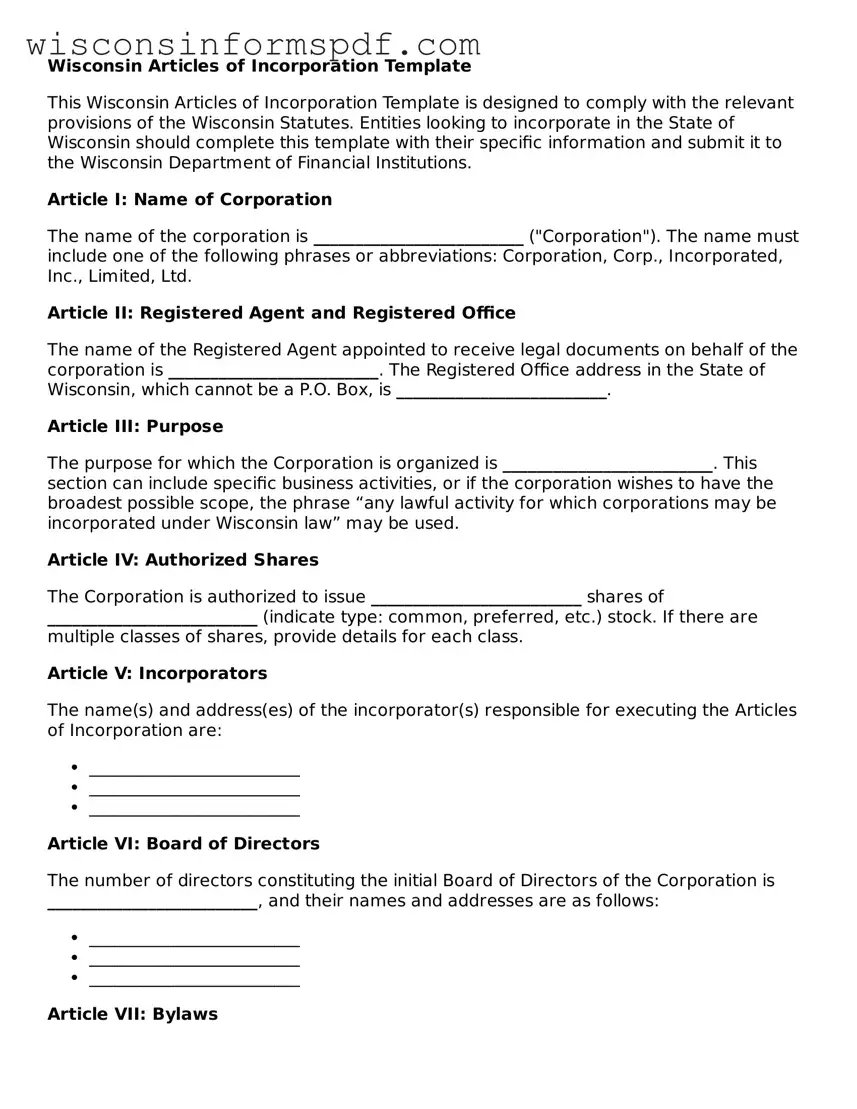Wisconsin Articles of Incorporation Template
This Wisconsin Articles of Incorporation Template is designed to comply with the relevant provisions of the Wisconsin Statutes. Entities looking to incorporate in the State of Wisconsin should complete this template with their specific information and submit it to the Wisconsin Department of Financial Institutions.
Article I: Name of Corporation
The name of the corporation is _________________________ ("Corporation"). The name must include one of the following phrases or abbreviations: Corporation, Corp., Incorporated, Inc., Limited, Ltd.
Article II: Registered Agent and Registered Office
The name of the Registered Agent appointed to receive legal documents on behalf of the corporation is _________________________. The Registered Office address in the State of Wisconsin, which cannot be a P.O. Box, is _________________________.
Article III: Purpose
The purpose for which the Corporation is organized is _________________________. This section can include specific business activities, or if the corporation wishes to have the broadest possible scope, the phrase “any lawful activity for which corporations may be incorporated under Wisconsin law” may be used.
Article IV: Authorized Shares
The Corporation is authorized to issue _________________________ shares of _________________________ (indicate type: common, preferred, etc.) stock. If there are multiple classes of shares, provide details for each class.
Article V: Incorporators
The name(s) and address(es) of the incorporator(s) responsible for executing the Articles of Incorporation are:
- _________________________
- _________________________
- _________________________
Article VI: Board of Directors
The number of directors constituting the initial Board of Directors of the Corporation is _________________________, and their names and addresses are as follows:
- _________________________
- _________________________
- _________________________
Article VII: Bylaws
The initial bylaws of the Corporation shall be adopted by the Board of Directors. The power to alter, amend, or repeal the bylaws or adopt new bylaws shall be vested in the Board of Directors unless otherwise provided in the Articles of Incorporation or the laws of Wisconsin.
Article VIII: Indemnification
The Corporation may indemnify any officer, director, employee, or agent to the fullest extent permitted by Wisconsin law.
Article IX: Duration
The duration of the Corporation shall be perpetual unless otherwise dissolved according to Wisconsin law.
Article X: Additional Provisions or Attachments
Additional provisions or attachments, if any, are as follows:
- _________________________
- _________________________
- _________________________
In witness whereof, the undersigned incorporator(s) have executed these Articles of Incorporation on _________________________ (date).
Signature of Incorporator: _________________________
Name of Incorporator (print): _________________________

